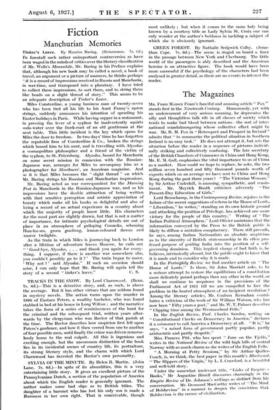Fiction
Manchurian Memories
Tinker's Leave. By Maurice Baring. (Heinemann. 7e. Cd.) To forestall such rather unimportant controversies as have been waged in the minds of critics over the literary classification Df Mr. Wells's Meanwhile, Mr. Baring in his Preface explains that, although his new book may be called a novel, a book of travel, an argument or a picture of manners, he thinks perhaps it is a record of impressions received in Russia and Manchuria, in war-time, and transposed into a phantasy. I have tried to collect these impressions, to sort them, and to string them like beads on a slight thread of story." This seems to be an adequate description of Tinker's Leave.
Miles- Consterdine, a young business man of twenty-seven who has been tied all his life to his Aunt Fanny's apron strings, suddenly announces his intention of spending his Easter holidays in Paris. While having supper in a restaurant, in pressing the lever of a syphon he inadvertently squirts soda-water over the frock-coat of an old gentleman at the next table. This little incident is the key which opens for Miles the door to freedom. In two days' time he has forgotten the reputable firm of Consterdine & Co., broken the strings which bound him to his aunt, and is travelling with Alyosha, a cosmopolitan philosopher and a friend of the victim of the syphon, to St. Petersburg. Alyosha, bound for Manchuria on some secret mission in connexion with the Russian- Japanese war, arranges for Miles to accompany him as a photographer for Skreibners', an American magazine. And so it is that Miles becomes the " slight thread " on which Mr. Baring strings his Russian and Manchurian impressions.
Mr. Baring acted as war correspondent for the Morning Post in Manchuria in the Russian-Japanese war, and so his impressions have the double attraction of being written with that sensitive perception and artistic appreciation of beauty which make all his books so delightful and also of being a record of an actual experience in a country about which the majority of people know little. His characters for the most part are slightly drawn, but that is not a matter of importance, for intimate psychological details are out of place in an atmosphere of galloping Cossacks, scheming Hun-hu-ses, green gowliang, lemon-coloured dawns and mauve twilights.
As the train in which Miles is journeying back to London after a lifetime of adventure leaves Moscow, he calls out " Good-bye, Alyosha, . . . and thank you again for every- thing. I suppose, if there is another war somewhere else, you couldn't .possibly go to it ? ' The train began to move. ' Why not ? ' said Alyosha." If such an occasion should arise, I can only hope that Mr. Baring will again tell the
story of a second " tinker's leave." C. S.






































 Previous page
Previous page